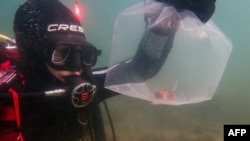A new study finds that marine heatwaves are changing the base of the marine food chain, disrupting ecosystems and potentially global food supplies.
Researchers in the investigation led by Australia’s national science agency, CSIRO, say their work has global implications.
The study monitored the health of microorganisms that lie at the base of the marine food chain. The survey is part of a long-term project spanning 12 years.
Tiny phytoplankton species developed smaller cells that are not easily consumed by larger animals. Researchers believe this could potentially have “profound changes all the way up the food chain.”
There could also be impacts on the ability of marine ecosystems to absorb - or sequester - carbon and the size of fish stocks.
The study’s lead author Mark Brown tells VOA that the study has far-reaching implications.
“This really is a global issue. Everywhere around the world is experiencing heatwaves. Even the warmest places like the Red Sea are pushing their temperatures higher and higher than the longterm average," Brown said. "Places like the Arctic and the Antarctic can have marine heatwaves and those might be the places where it is really important to study because any changes to those large polar ecosystems will really have (a) significant impact on the global food stocks.”
Marine heatwaves involve extended periods of abnormally warm ocean water.
Scientists warn they can have significant impacts on marine life, including fish, coral reefs and kelp forests.
The basis of the research by the Commonwealth Scientific and Industrial Research Organization was a marine heatwave in the Tasman Sea off the island state of Tasmania in 2015 to 2016.
The CSIRO team found that the extreme conditions “transformed the microbial community” to resemble those found in far warmer waters 1,000 kilometers to the north.
The CSIRO team says that climate change is intensifying the impact of marine heatwaves, which can also be influenced by naturally occurring weather phenomena, including the El Niño pattern.
Brown says while the organisms they study are small, their importance is huge.
“They are minuscule, and you cannot see them with the naked eye," he said. "So, all these things are invisible. Just like your gut microbes enable you to have a healthy ecosystem in your body and turn nutrients into energy etcetera, the same processes occur in the ocean, but it is very difficult to study. So, this is why we need to use genomic techniques, DNA sequencing etcetera in order to really analyze what is there.”
The CSIRO findings have been published in the journal Nature’s Communications Biology.




